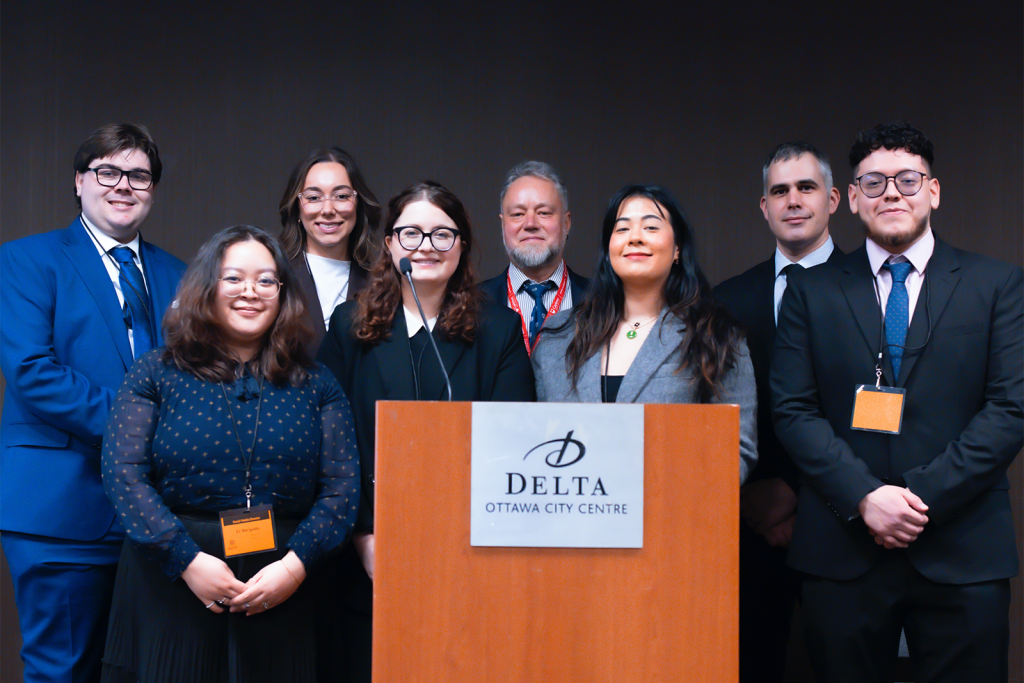Photo credit: Marcelo Jaramillo Cárdenas
By: Jessica Stewart, MIPP
The months of preparation played a pivotal role in the challenging yet rewarding weekend of the Carleton Model NATO. From marking position papers to slamming the gavel, Model NATO taught me the importance of collaboration, the difficulty of reaching consensus, and the value of Canadian alliances. As a leading member of the secretariat, I helped guide the 22nd annual Carleton Model NATO simulation in Ottawa. Participants ranged from first year undergraduates from the west coast at Fraser Valley University to PhD candidates from the east coast at Acadia University. This diversity of participants made for some of the most complex and lively debates I was privileged to witness and facilitate.
My role within the conference was chair of the North Atlantic Committee, the principal decision-making body within NATO. During this three-day conference, we successfully completed a 2-day simulation, where my committee passed two communiques on the topics of cyber security and climate security. This did not come easy. We spent hours debating in moderated and unmoderated caucuses from 9am to 10pm on some days. The heavy feeling of defeat amongst students who felt as though their countries’ goals were not being recognized, the frustration of those whose priorities were acknowledged but defeated in the voting session mirrored what I imagine a true NATO procedure would feel like. Watching students grow into their role and realize the obscure nature of debates and consensus was fundamental to understand the nature of these types of alliances. In seeing this unfold, it was made obviously clear that politics are rooted in most countries’ arguments for defense, and within every discussion on military investments.
Politics was an underlying theme amongst discussions on the future of NATO from keynote speakers from NATO and the Department of National Defence, as well as the ambassadors from both the United States and Germany. In touring the United States embassy, we were faced with the looming question posed by an ambassador: “how to we feel about Canada’s failed commitment to investing 2% of its GDP to defence spending?”. In answering this question, students echoed the same concerns of those from DND ministers and NATO officials, expressing that Canada must urgently express its commitment to the alliance.
Canada must act. Canada is outlier within NATO. The country is not only failing to reach the targeted spending but has no plan in place to do so. However, we faced the same roadblock we struggled to surpass in our simulation: politics. Not only is military spending a highly politicized concept, but it is also one that does not appeal to voters. Canada is in a difficult position and the government has chosen to focus on domestic concerns over foreign ones. As expressed by the US ambassador, Canada has pressing concerns we must prioritize over military spending. However, Canada needs NATO, just as much as NATO needs Canada.
The need for Canada to fulfill its commitments to NATO will only become more pressing given the growing importance of the Arctic region and the profitability of the Northwest Passage. The creation of NORAD in 1957 was prompted by the Soviet Union threatening US and Canadian interests throughout the Cold War. The invasion of Ukraine in 2022 has deepened western fears of possible Russian strategic initiatives that could put the North American Arctic at risk in the longer term. In addition, China has declared itself to be a near-Artic state and has increased its scientific, economic, and military activities in the region. Furthermore, China and Russia are closely watching the potential and opportunity of utilizing the Northwest Passage as a trading route between Europe and Asia. By securing then opening the Northwest Passage to trade, Canada could increase its standing with other world powers. As these developments continue build pressure, Canada needs to honour its commitments on the global stage. As US ambassador David Cohen said in a recent publication, “the world is watching”.
Hearing firsthand from politicians and policy advisors, the biggest takeaway is that Canada needs to create a plan to honour its NATO commitments. This conference was engaging and challenging, highlighting the importance of the NATO alliance for Canada and member States.
Canada’s higher education system is producing a new generation of thinkers and leaders who I am excited to work alongside. Carleton NATO allowed me to take a leadership role and showcase my academic skills learned at Balsillie on a national level.
The opinions expressed in this article are those of the author(s) and do not necessarily reflect the views of the BSIA, its students, faculty, staff, or Board of Directors.
